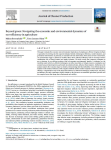Boroushaki M., Olsen T.L. (2025). Beyond green: navigating the economic and environmental dynamics of eco-efficiency in agriculture. Journal of Cleaner Production, 25/06/2025, vol. 512, p. 145629.
https://doi.org/10.1016/j.jclepro.2025.145629
https://doi.org/10.1016/j.jclepro.2025.145629
| Titre : | Beyond green: navigating the economic and environmental dynamics of eco-efficiency in agriculture (2025) |
| Auteurs : | M. Boroushaki ; T.L. Olsen |
| Type de document : | Article |
| Dans : | Journal of Cleaner Production (vol. 512, June 2025) |
| Article en page(s) : | p. 145629 |
| Langues : | Anglais |
| Langues du résumé : | Anglais |
| Catégories : |
Catégories principales 07 - ENVIRONNEMENT ; 7.5 - Dégradation : Impact, DésertificationThésaurus IAMM SYSTEME DE PRODUCTION ; AGRICULTURE ; IMPACT SUR L'ENVIRONNEMENT ; EVALUATION DE L'IMPACT ; GESTION DES EAUX ; EFFICACITE |
| Résumé : | This paper evaluates the economic and environmental implications of adopting eco-efficient irrigation methods in agriculture by delving into the nuanced interplay between technological efficiency, market dynamics, and government interventions. In particular, it examines how such innovations, while aimed at water conservation, can paradoxically trigger a rebound or backfire effect, where enhanced efficiency leads to increased resource consumption due to altered demand and supply dynamics. The study reveals that consumer willingness to pay a premium for eco-efficient products does not guarantee environmental benefits. It elaborates on the conditions under which eco-efficient technologies can either exacerbate or mitigate resource consumption and assesses how government policies, particularly tax-subsidy schemes, influence these dynamics. Furthermore, the analysis explores the economic impact on farmers, demonstrating that the profitability of eco-efficient practices depends on the technical efficiency of the irrigation methods and the market?s response to these innovations. By offering a comprehensive view of the interaction between eco-efficient technologies, market forces, and policy mechanisms, this study contributes valuable insights to the discourse on sustainable agricultural practices and the complex factors that shape their effectiveness and viability. |
| Cote : | Réservé lecteur CIHEAM |
| URL / DOI : | https://doi.org/10.1016/j.jclepro.2025.145629 |







